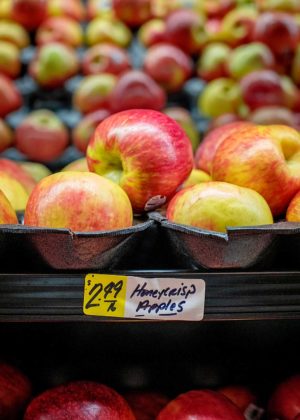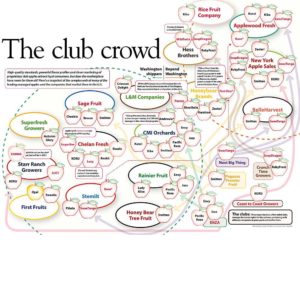
The pandemic panic thrust grocery chains into chaos this spring, and to simplify the produce department, many reduced SKUs and sidelined premium apple varieties.
“That really hurt club apples,” said Roger Pepperl, marketing director for Stemilt Growers. “We’re seeing the SKU count come back now that people aren’t hoarding toilet paper. There’s more room on supermarket trucks.”
COVID-19, the disease caused by the novel coronavirus, has disrupted almost every aspect of the produce supply chain in some way, but it hit especially hard for new and niche apples trying to build relationships with retailers and consumers.
“Your plan for putting new products in front of customers, it was gone overnight,” said Don Roper, vice president of sales for Honeybear Brands. He canceled more than 100 demos for Pazazz.
Retailers have since regained their footing and begun to stock more than just the core varieties again. But in this new normal, where consumers continue to shop online or are shifting their in-store habits, marketers must identify how best to introduce and promote apple brands online and rethink their approach to packaging when shoppers now prefer to grab a pouch bag of untouched apples.
“We were just starting to say that we have to get rid of all this plastic to protect the planet, and now it’s whiplash. The fastest selling apple SKU is a pouch bag,” Roper said.
That’s an opportunity for branded apples, many of which are bicolored fruit that look pretty similar in a bulk display, with just a small sticker for identification, said Bob Mast, president of CMI Orchards.
“One of the challenges with selling these proprietary varieties is: ‘How do you set them apart for consumers?’” he said. Bag sales allow for more marketing and space to “educate consumers on what makes them special.”
Online shopping could be very difficult for products that lack consumer awareness, said Steve Lutz, an industry consultant at Category Partners. A customer looking for apples may just click on Gala or Honeycrisp, rather than scroll a list to find something new to try or remember the name of the apple they liked last year.
Pepperl expressed optimism about the potential of online shopping for apple sales. Websites often offer an opportunity to provide shoppers more information than a store display can, and to tell an apple’s story. He’s also excited about the potential of more targeted digital advertising within these shopping platforms.
“Can we pop up an ad for the people who bought Rave to buy SweeTango? Then we are marketing to a set of customers who already buy premium apples,” he said. “The capabilities are really endless. It’s whether we maximize them that is the question.”
In this era of social distancing, social media marketing has also become even more important to help connect consumers to fruit, said Tenley Fitzgerald, vice president of marketing at Yes! Apples, the brand launched by New York Apple Sales in 2019.
“With harvesting coming up, we have an opportunity to introduce all our varieties to consumers in interesting and fun ways” by partnering with social media influencers, Fitzgerald said. For example, she’s promoted Koru with outdoor athletes as an apple that’s ready for adventure.
Beyond marketing challenges and innovation, the pandemic-driven unemployment and economic stress may also move some consumers away from the premium apple sector, Lutz said.
But the challenges facing branded apple programs in 2020 can’t be pinned solely on the pandemic, sources agreed.
“This COVID is taking the blame for a lot of things that were going to happen anyway,” Pepperl said. “There’s a lot of good apples out there right now, and you have to be great.” •
—by Kate Prengaman







Leave A Comment